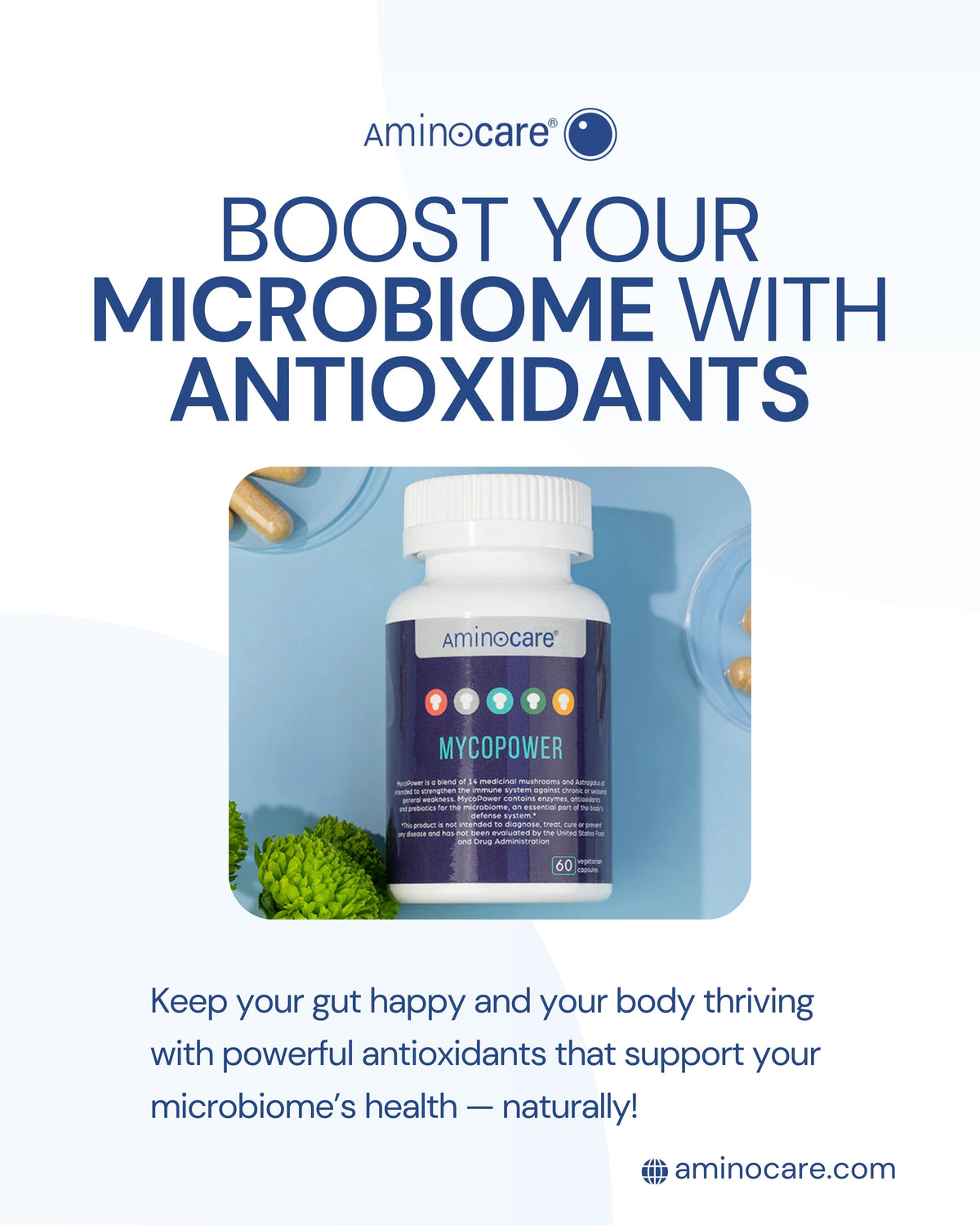*Niniejsze oświadczenia nie zostały ocenione przez Food and Drug Administration. Ten produkt nie jest przeznaczony do diagnozowania, leczenia, leczenia ani zapobiegania jakiejkolwiek chorobie. Przed rozpoczęciem jakiejkolwiek diety, ćwiczeń lub programu suplementacji, przed zażyciem jakichkolwiek leków lub jeśli masz lub podejrzewasz, że możesz mieć problem zdrowotny, należy skonsultować się z pracownikiem służby zdrowia. Jeśli po zażyciu tego suplementu diety wystąpią jakiekolwiek niekorzystne warunki, należy natychmiast przerwać stosowanie i skonsultować się z lekarzem. W przeciwnym razie nie należy przerywać przyjmowania leków bez konsultacji z lekarzem.
Boost Your Microbiome With Antioxidants | Aminocare

Did you know that over 70% of your immune system resides in your gut? This staggering statistic highlights the crucial role that a healthy microbiome plays in your overall well-being. The health of your gut microbiota is intimately linked to a myriad of factors, including digestion, nutrient absorption, and even your immune response. One of the pivotal elements in maintaining a thriving microbiome is the intake of antioxidants. In this guide, we’ll explore how antioxidants can protect your gut bacteria from oxidative stress, promote a balanced microbiome, and ultimately support your health. So, if you're ready to take control of your microbiome and enhance your well-being, keep reading!
Understanding the Microbiome
The microbiome refers to the complex ecosystem of microorganisms living in your body, primarily in your gut. These bacteria, viruses, fungi, and other microbes outnumber human cells ten to one and play essential roles, from digesting food to regulating immune function.
What Are Antioxidants?
Antioxidants are compounds that combat oxidative stress — a harmful process that occurs when free radicals, which are unstable molecules, overwhelm the body's ability to neutralize them. This imbalanced state can lead to cellular damage, promoting inflammation and various chronic conditions. Antioxidants neutralize free radicals and mitigate this oxidative stress, making them essential for maintaining health.
The Link Between Antioxidants and the Microbiome
Research has shown that antioxidants can significantly influence the health of your microbiome. When the gut microbiota encounters oxidative stress, it can lead to dysfunction, an imbalance between beneficial and harmful bacteria. By protecting gut bacteria with antioxidants, you support a balanced microbiome, which is crucial for good health.
How Antioxidants Protect Your Gut Bacteria
1. Combatting Oxidative Stress
Antioxidants like vitamin C, vitamin E, and glutathione can mitigate the effects of oxidative stress on gut bacteria. This protective effect helps maintain a diverse and thriving microbiome by ensuring that beneficial bacteria can flourish without the threat of damage.
2. Promoting Diverse Gut Flora
Studies have indicated that diets rich in antioxidants encourage a diverse population of gut bacteria, which is associated with better health outcomes. A diverse microbiome is more resilient and capable of resisting pathogenic bacteria.
3. Enhancing Digestive Health
Antioxidants help to ensure the integrity of the gut lining, reducing inflammation and promoting efficient digestion. A healthier gut leads to better absorption of nutrients and minimizes gastrointestinal issues.
4. Supporting Immune Function
A strong immune system requires a healthy microbiome. Antioxidants contribute to maintaining the balance of gut bacteria, promoting an effective immune response. The gut-associated lymphoid tissue (GALT), which is part of the immune system, heavily relies on a healthy microbiome.
The Best Sources of Antioxidants
Incorporating a variety of antioxidant-rich foods can improve your microbiome and overall health. Here are some excellent sources:
- Fruits and Vegetables: Berries, leafy greens, carrots, and citrus fruits are all rich in antioxidants and should be staples in your diet.
- Nuts and Seeds: Almonds, walnuts, and sunflower seeds provide vitamin E, a crucial antioxidant.
- Whole Grains: Foods like oatmeal and quinoa offer phenolic compounds that act as antioxidants.
- Herbs and Spices: Turmeric, cinnamon, and green tea are rich in antioxidants known for their health benefits.
Strategies for Boosting Your Microbiome with Antioxidants
1. Adopt a Plant-Based Diet
Focus on incorporating more plant-based foods into your diet. The fiber found in fruits and vegetables not only enhances the diversity of your microbiome but also acts as a prebiotic, feeding your gut bacteria.
2. Stay Hydrated
Water plays a crucial role in digestion and nutrient absorption. Ensuring you stay hydrated can help optimize the functionality of your gut bacteria.
3. Limit Gut Disruptors
Processed foods, excess sugar, and artificial additives may negatively impact your gut microbiome. Limiting these can help maintain a healthy balance.
4. Consider Supplements
While it’s essential to get your antioxidants from whole foods, considering high-quality supplements can also be beneficial. Make sure to choose supplements that specifically support gut health and include antioxidants.
Common Questions About Antioxidants and the Microbiome
- Can I get enough antioxidants from my diet?
Yes, a diverse and balanced diet can provide sufficient antioxidants. However, it may vary based on individual dietary restrictions and preferences.
- Are all antioxidants created equal?
Different antioxidants have different roles, and some may be more effective than others depending on your specific health needs.
- How can I tell if my microbiome is healthy?
Signs of a healthy microbiome can include regular digestion, a balanced mood, and general wellness. However, for a more detailed assessment, consider consulting a healthcare professional for gut health tests.
Conclusion: Cultivating a Thriving Microbiome
So where do we go from here? Understanding the vital role of antioxidants is the first step toward enhancing your microbiome and overall health. By incorporating antioxidant-rich foods into your diet, limiting gut disruptors, and staying well-hydrated, you can support the health of your microbiome.